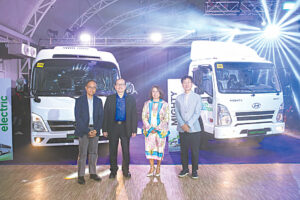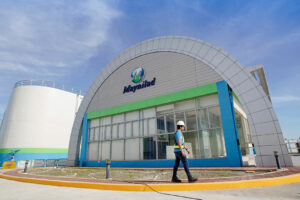Electric, diesel commercial vehicles for ‘Byahenyos’

By Dylan Afuang
HARIPHIL ASIA RESOURCES, INC. (HARI), the official Philippine distributor of Hyundai Truck and Bus (HTB) commercial vehicles (CVs), emphasized its being a “relevant partner of Philippine entrepreneurs” by introducing to the market new and electric CVs and a transport solution. This comes after HARI saw a rise in reception for the South Korean mobility provider’s CVs.
“The vehicles that we launch today — and those we plan to introduce soon — are purposely selected for Filipino enterprises to tackle present and future challenges head-on, while giving them the freedom to contribute to the country’s advancement,” HARI Vice-Chair, President, and CEO Maria Fe Perez-Agudo said in a statement provided by the company, after it held the Hyundai Truck and Bus Mobility EV-olution Expo in Alabang weeks ago.
At the event, HARI launched the Hyundai Mighty Electric light-duty truck, County Electric minibus, and the diesel engine-powered and locally assembled Hari Cab truck. The company also introduced its “Byahenyo Program” that is “envisioned to be a movement for empowering local entrepreneurs through world-class vehicles.”
“(HARI prioritizes) affordability, easy maintenance, and nationwide after-sales support (for Hyundai CVs),” Ms. Perez-Agudo continued. “By aligning with government programs and providing flexible financing, HARI ensures Hyundai (CVs) are accessible and sustainable for MSMEs (micro, small, and medium enterprises) and transport cooperatives,” the executive added.
The company’s vision is to “improve the customer experience,” Hyundai Motor Company Asia-Pacific Vice-President Jun Heo said in his message during the Mobility Expo. The local HTB dealership network, public transport cooperatives, and officials from the Department of Transportation (DoTr) and the Electric Vehicle Association of the Philippines (EVAP) were among those who gathered at the event.
A mining company and transport cooperative are set to acquire Hyundai CVs, and the distributor achieved “27% growth in 2024” compared to the previous year, HARI leadership announced to the event attendees and the media.
The County and Mighty electric commercial vehicles (e-CVs) are part of HARI’s push for clean and sustainable transport. The County Electric, which can accommodate 22 passengers plus the driver, is billed as the mobility brand’s first pure-electric minibus. The minibus is equipped with a 128-kWh lithium-ion battery, boasts a rapid 72-minute charging time, and an estimated range of 303km.
In “extensive simulated operational testing covering 100,000 kilometers or five years of service,” the County can realize 21% savings in maintenance costs compared to an internal combustion engine (ICE)-powered vehicle of the same type, HARI claimed.
The Mighty Electric can accommodate specific business requirements as the truck can be customized by HARI’s partner builder, Centro Manufacturing Corp. Equipped with a 114.5-kWh lithium-ion battery, the vehicle has an estimated range of 260km.
In five years or when it has reached 100,000 kilometers, the electric truck, with its “reduced mechanical complexities and minimal fluid change requirements,” can promise up to 9% lower maintenance costs compared to an ICE vehicle, the firm boasted.
The locally assembled HARI Cab is touted as designed for Filipino communities. The vehicle, which is powered by a Euro 4 diesel engine, comes with a variety of body options, including the Aluminum Van, Shuttle, and School Bus to accommodate the needs of logistics providers, small businesses, cooperatives, and local government units nationwide.
Depending on the configuration and specifications of the Cab, the truck carries suggested retail prices ranging from P1.767 million to P2.362 million, and internal company testing revealed that the vehicle has a fuel consumption of 10.35kpl.
HARI is supported by eight dealerships, eight outlets, and two service centers.




